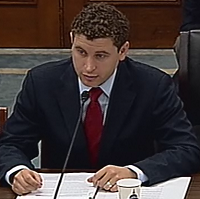 Trying to get more ethanol out of every part of the corn is the goal for many alternative fuel producers. With demand for the actual grain of corn for food, scientists are looking at the rest of the plant to try to extract ethanol. This article from the American Chemical Society’s journal Industrial & Engineering Chemistry Research says researchers have found that white rot fungus is showing promise in unlocking 50 percent more sugar from the stock and cobs, corn stover, that can be converted into ethanol:
Trying to get more ethanol out of every part of the corn is the goal for many alternative fuel producers. With demand for the actual grain of corn for food, scientists are looking at the rest of the plant to try to extract ethanol. This article from the American Chemical Society’s journal Industrial & Engineering Chemistry Research says researchers have found that white rot fungus is showing promise in unlocking 50 percent more sugar from the stock and cobs, corn stover, that can be converted into ethanol:
Yebo Li and colleagues explain that corn ethanol supplies are facing a crunch because corn is critical for animal feed and food. They note that the need for new sources of ethanol has shifted attention to using stover, which is the most abundant agricultural residue in the U.S., estimated at 170-256 million tons per year. The challenge is to find a way to break down tough cellulose material in cobs, stalks and leaves – so that sugars inside can be fermented to ethanol. Previous studies indicated that the microbe Ceriporiopsis subvermispora, known as a white rot fungus, showed promise for breaking down the tough plant material prior to treatment with enzymes to release the sugars. To advance that knowledge, they evaluated how well the fungus broke down the different parts of corn stover and improved the sugar yield.
While the researchers are able to extract a significant amount of sugar for ethanol from the leaves as well, it’s less than the stalks and cobs. Since the leaves are good for the soil, they point out those leaves can be left in the field to recharge the soil.














 The
The